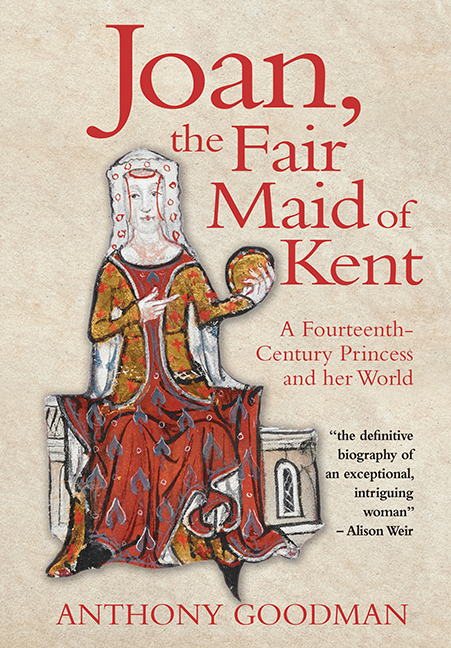Book contents
- Frontmatter
- Dedication
- Contents
- List of Illustrations
- List of Abbreviations
- Maps
- Genealogical Tables
- 1 Loosened Bonds
- 2 Tragic Beginnings
- 3 Bigamy
- 4 Married Bliss
- 5 A Whirlwind Rom
- 6 Princess of Wales and of Aquitaine
- 7 Deaths of Princes
- 8 The King's Mother
- 9 Terrors and Tribulations
- 10 Venus Ascending?
- Notes
- Bibliography
- Acknowledgements
- Index
- Frontmatter
- Dedication
- Contents
- List of Illustrations
- List of Abbreviations
- Maps
- Genealogical Tables
- 1 Loosened Bonds
- 2 Tragic Beginnings
- 3 Bigamy
- 4 Married Bliss
- 5 A Whirlwind Rom
- 6 Princess of Wales and of Aquitaine
- 7 Deaths of Princes
- 8 The King's Mother
- 9 Terrors and Tribulations
- 10 Venus Ascending?
- Notes
- Bibliography
- Acknowledgements
- Index
Summary
JOAN PLANTAGENET, widely acclaimed as the ‘Fair Maid’ for her great beauty, was born in a century marred by domestic and foreign upheavals and by dynastic struggles. It was moreover a time of persistent, deeply entrenched attitudes towards women, their natures and their roles. Yet there were also some green shoots of change which were to produce significant and more diverse attitudes. Joan's life clearly reflects these changing attitudes.
In the fourteenth century, there were deeply embedded beliefs that, although male and female souls were equal, Man was superior in physique, intellect and purpose because he was made in God's image – and Woman was not. This tenet, and the hierarchical deductions which flowed from it, were upheld by formidable cohorts of authorities. These were passages from the Old and New Testaments and the works of the Church Fathers, ancient works on philosophy and medicine, and the formulations of modern theologians and experts in canon law. Let us consider the medical imperatives, as laid down by classical Greek writers, whose influence survived into the nineteenth century. Food, it was thought, was converted in humans into four sets of intermingling fluids, known as ‘humours’, whose particular mixture determined character.
Men's predominant humours were characterised as hot and dry, inclining them to be strong and courageous, whereas women's typically cold and wet humours made them weak, timorous and devious. Women were programmed to cling to men, distracting them from their naturally brave and lofty purposes. This view of gender relations was to be encapsulated by Shakespeare in King Henry IV, Part One (Act 2 scene 3). Hotspur, desperate to be at the head of an imminent rebellion, is trying to conceal his intentions from his wife. She is suspicious, prying, wheedling. She threatens feebly. Hotspur (Henry Percy), exasperated, makes a show of repudiating her love, and of despising her charms. He cruelly distrusts her discretion:
Constant you are
But yet a woman; and for secrecy
No lady closer, for I well believe
Thou wilt not utter what thou dost not know.
And so far will I trust thee
However, Hotspur is portrayed as a swaggering braggadocio, conspicuously lacking his wife's good sense. Shakespeare is here playing with and subverting traditional stereotypes.
- Type
- Chapter
- Information
- Joan, the Fair Maid of KentA Fourteenth-Century Princess and her World, pp. 1 - 7Publisher: Boydell & BrewerPrint publication year: 2017



